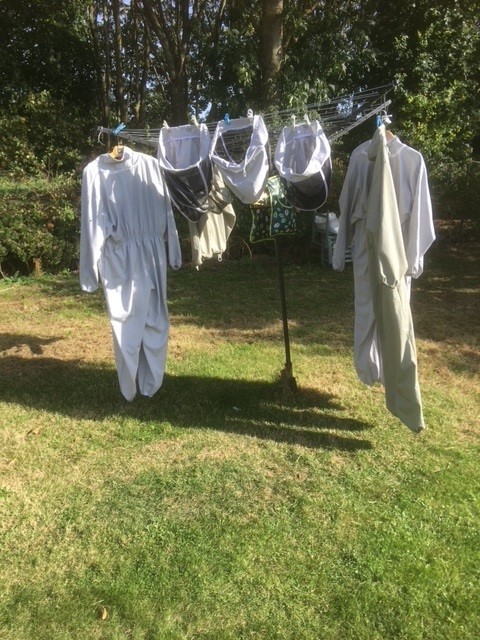The Apiary in October
Title photo: Last of the Borage
As the cold and wet of Autumn creeps in, our colonies will be out on warm dryish days collecting the last of the Pollen and Nectar which is available in their district including Borage and Ivy.


The wasps numbers have reduced but time to get those Mouse Guards on and take all the empty supers off and into storage. I attempt to do a little maintenance on equipment before I store it away inside or out ensuring mice cannot get in to make a right smelly mess of a winter home.
Any supers or Brood Chambers stored with decent comb in, need a solid sealed floor with a Queen Excluder on top to keep the mice well and truly at bay.
Also time to clean the Bee Suits up ready for storage, not left hanging in the bee shed to breed mildew. Again away from mice who love to use the pockets as a winter nest.

By the end of the month, after another ‘wettest ‘ month on record in some parts, we should have fed all of our colonies so enabling them to get through the famine of the next few months, surviving on those stores in the brood boxes.
It is now too cold to be feeding syrup as the bees will be unable to get the water content down low enough to prevent it going mouldy and unusable. Fermentation will rule.
But a good kilogram of Fondant on top of the Queen Excluder above the cluster will prevent any hunger problems as the next few months pass. Remember to seal it in plastic, cling film or a plastic bowl so it doesn’t dry out as hard as concrete – which will be no good to man nor bee!
The next lot of storms are on their way (why they all have nice names these days I will never know), so leave the bees well alone. They will have sealed the hive with propolis so no predators or cold droughts can get in and the last thing they need is some “keen” Beekeeper coming along and breaking those seals examining the hive.
Keeping the interior dry is essential. Damp wet conditions will kill a colony well before any cold snap will, so a couple of small blocks under the back legs of the hive stand will drain any water off the roof and floor forward onto the ground.
Last but not least, keep the Varroa screens in place at present keeping an eye on the debris thrown or dropped through the mesh floor. This in itself will tell a tale on the condition of the clustering colony.
Next Month: Strap down and Woodpecker protection as we move into the really foul weather, and attend the Winter indoor meetings at Luddington Village Hall.

